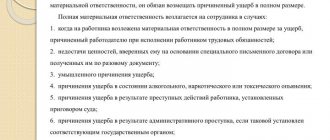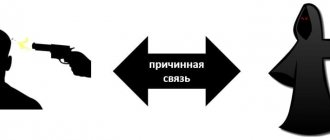Confiscation of property means its forced and gratuitous seizure from the owner who has committed a certain offense. This procedure is carried out in favor of the state or the victim and is regulated by Civil, Administrative and Criminal Law, in particular, Art. 235, 243 Civil Code and 104.1 Criminal Code. If the application of a measure implies the termination of property rights, it requires the mandatory presence of an appropriate court decision (Part 3 of Article 35 of the Constitution).
The concept of “confiscation”
Confiscation of property is a type of punishment applied by court decision to violators, consisting of the transfer of property in various amounts to the state free of charge.
Forfeiture as a sanction for violation requires a court decision on legal grounds as an adequate punishment for the crime committed.
It is used in criminal practice, civil, administrative, and customs legislation. Article 243 of the Civil Code of the Russian Federation defines the features, concept, grounds, types and procedure for confiscation of property.
The property confiscation law applies to the seizure of:
- valuable property obtained during the commission of an unlawful act;
- funds received in the course of criminal activity;
- other property that the offender received as a result of the crime, and income from this property;
- banknotes and property that is intended to finance criminal and terrorist activities;
- instruments for committing a crime;
- property that was transferred to another person, provided that this person had information about how this property was received.
Problems with the use of punishment
This form of liability is assigned in strictly prescribed cases by law. But even here its purpose is not without certain problems. For example, the Criminal Code of the Russian Federation must not only provide compensation for damage, but also not violate the rights of the criminal. However, there is one more feature here. Compensation is subject to not only material, but also moral damage to the victim.
The court's decision on confiscation must be reflected in the verdict. There are no other documents confirming the imposition of such a punishment. At the same time, such a decision should be reflected precisely in the operative part of the sentence, since it is there that the fact of finding a person guilty of committing a crime is stated.
Grounds for confiscation
Confiscation is applied only on the basis of a court decision as a result of the commission of an offense by a certain person. Items that are confiscated into state ownership are property obtained in the course of criminal activity or for the financing of crimes and terrorism. The concept of confiscation extends to objects of the material world. If intellectual property is involved, the media is confiscated.
Seizure of tangible property, according to the rules of law, is one of the forms of termination of ownership rights to these things. Under civil law, confiscation of property is considered a civil sanction. Confiscation is ordered by a judicial authority for compelling reasons.
What can be confiscated
Confiscation occurs only on the basis of a court decision. Full confiscation is carried out only by law if this measure is adequate to the crime committed.
The list of items subject to confiscation includes:
- money and valuable property that was obtained in the course of criminal activity;
- property that is intended to support terrorist activities;
- proceeds from property obtained as a result of a crime;
- property obtained during the commission of a crime and transferred to another person is confiscated from this person, provided that this person knew about the source of such property;
- jewelry, luxury items, antiques;
- instruments for committing illegal actions.
In some cases, by court decision, confiscation of a sum of money is applied in exchange for property.
The following cannot be confiscated:
- residential real estate, if this is the person’s only home;
- plots of land, if they comply with the features specified in the provisions of the law. Confiscation of a land plot is possible only in accordance with the law, taking into account the specifics of the case;
- personal items;
- household items;
- things that are necessary for the professional activities of the debtor;
- transport, if a disabled person needs it for movement;
- Food;
- money up to a certain amount;
- prizes and awards;
- seeds for sowing.
Problems of property confiscation may relate to the types of property that are subject to confiscation and the specifics of the procedure in each specific case.
What property cannot be seized?
If the offender was ordered to confiscate property, the sentence must indicate exactly what part of it should be taken away. However, there are such items and things that cannot be confiscated in any case:
- Housing, if it is the only place where the offender can live. Also, an apartment cannot be taken away if people who are dependent on the offender live in it: parents, children, disabled relatives.
- A plot of land, if it is not used for the purpose of generating income.
- Household items: clothes, shoes. However, this does not include valuable personal items: bracelets, watches and others.
- Devices with which the offender can carry out professional activities.
- Animals, as well as food for their maintenance and utility rooms where they live.
- Food products, seeds for the next sowing work. In addition, fuel cannot be confiscated if it is necessary to maintain the normal life (cooking, heating) of members of the criminal’s family.
- Vehicles or special devices without which the offender cannot move because he is disabled.
- Awards, memorial signs, medals, honorary titles that were granted to a person by the state.
As you can see, there is property that is not subject to confiscation even if the criminal committed a particularly serious crime.
Confiscation rules
Confiscation of property is considered by the provisions of administrative, criminal, customs, and civil legislation. The main feature is that the confiscation of property is carried out, according to a court decision, as a sanction against the violator.
Seizure of property is used as a legal consequence of a transaction that is contrary to the norms of morality and law and order. Confiscation of property is a way to protect the rights of a person who has suffered in the course of an illegal transaction that was unfavorable to the victim, committed under the influence of primus, force, psychological or physical pressure.
Types of confiscation
The content of confiscation of property is considered by the provisions of legal norms of various specializations. There are two types of confiscation:
- general, complete confiscation is a strict penalty that is applied in exceptional cases.
- special, which is used to seize property obtained as a result of criminal activity, items that are prohibited in free circulation, property that was used to implement criminal intent.
According to the law, either the first or second type is applied.
General confiscation of property is the most controversial and radical method, which many countries are abandoning. The return of confiscation is carried out in accordance with the law.
Confiscation procedure
The procedure for confiscation of property is considered in the provisions of the law. The specifics of confiscation within the framework of civil law are set out in the Civil Code of the Russian Federation and regulations. Confiscation proceedings require the seizure of items that were used for or obtained as a result of the commission of a crime.
The list of property that may be subject to seizure is set out in the provisions of civil law. Confiscation of land and other real estate is possible if the property is not the only suitable building for a certain person and his family. Types of property confiscation include general and special options, the latter is used in most cases.
Judicial practice under Article 104.1 of the Criminal Code of the Russian Federation
Appeal ruling of the Judicial Collegium for Criminal Cases of the Supreme Court of the Russian Federation dated 06/07/2018 N 50-APU18-8
The fate of the material evidence - a car belonging to Yusupov M.A. (vol. 1, pp. 66 - 69), permitted on the basis of Art. 81 part 3 clause 1 of the Code of Criminal Procedure of the Russian Federation and Art. 104.1 part 1 paragraph “d” of the Criminal Code of the Russian Federation, according to which tools, equipment or other means of committing a crime belonging to the accused are subject to confiscation. Since the verdict established that the specified car was used by B.I. Nurimbetov. and Yusupov M.A. to commit crimes, the confiscation of the vehicle complies with the requirements of the law.
Cassation ruling of the Judicial Collegium for Criminal Cases of the Supreme Court of the Russian Federation dated June 21, 2018 N 50-UD18-4
The funds seized from the convicted person in the amount of 10,795,000 rubles, 15,900 US dollars, as well as the Mercedes-Benz E-300 car, which were recognized as material evidence, were confiscated in relation to the provisions of paragraph “d” of Part 1 of Art. 104.1 of the Criminal Code of the Russian Federation. However, the decision taken by the court regarding the confiscation of these items was not motivated.
Appeal ruling of the Judicial Collegium for Criminal Cases of the Supreme Court of the Russian Federation dated July 26, 2018 N 44-APU18-9SP
Since the Toyota Camry car (state registration plate...) actually belonged to the convicted woman and was used in the commission of the murders of O. and S. to deliver them to the place of deprivation of life, the decision to confiscate it to the state’s income complies with the requirements of paragraph “d” of Part. 1 tbsp. 104.1 of the Criminal Code of the Russian Federation.
Appeal ruling of the Judicial Collegium for Criminal Cases of the Supreme Court of the Russian Federation dated September 13, 2018 N 33-APU18-11
Physical evidence stored in the FKU Central House of Artists and the Main Directorate of the Ministry of Internal Affairs of Russia for St. Petersburg and the Leningrad Region, a Mercedes C200 car with a state registration plate ... belonging to V.V. Lysenko, and a BMW 320D car with a state registration plate ..., owned by Sultanov A.M., in accordance with paragraph “g” of Part 1 of Art. 104.1 of the Criminal Code of the Russian Federation, confiscated and turned into state revenue.
Appeal ruling of the Judicial Collegium for Military Personnel Cases of the Supreme Court of the Russian Federation dated October 16, 2018 N 208-APU18-13
Questions about the fate of material evidence, including a mobile phone, were resolved correctly by the court. The electronic device seized from the convicted person, based on the established specific circumstances of the case, was used by him in the course of establishing contacts with a member of an international terrorist organization and obtaining data from him for the financing of terrorism, and therefore it is subject to confiscation in accordance with the requirements of Part 1 of Art. 104.1 of the Criminal Code of the Russian Federation.
Appeal ruling of the Judicial Collegium for Criminal Cases of the Supreme Court of the Russian Federation dated January 31, 2019 N 35-APU19-1
Since the submission did not raise the question of allowing the said material evidence in accordance with Art. 104.1 of the Criminal Code of the Russian Federation and the convicted Petrov A.V. refused to hand over the said material evidence to him, the Judicial Panel agrees with the court's decision to destroy them. In case of doubts and ambiguities when calculating the term of serving the sentence, Petrov A.V. and Petrov M.Yu., this issue can be resolved in accordance with the provisions of Art. 397, 399 of the Code of Criminal Procedure of the Russian Federation in order to execute the sentence.
Appeal ruling of the Judicial Collegium for Criminal Cases of the Supreme Court of the Russian Federation dated February 13, 2019 N 48-APU18-24
Contrary to the arguments of Sidorovsky and Syrchin, the fact of using the phones seized from them to commit crimes (to communicate with each other, with purchasers of narcotic drugs, etc.) is confirmed by the details of telephone conversations, during which the main issues related to illicit drug trafficking were resolved , in connection with which the court’s conclusions that telephones were instruments and means of committing crimes do not raise doubts about their correctness. In this regard, the court decision to confiscate telephones to the state on the basis of Art. 104.1 of the Criminal Code of the Russian Federation is correct.
Resolution of the Presidium of the Supreme Court of the Russian Federation dated March 27, 2019 N 2-P19
By the appeal verdict of the Supreme Court of the Komi Republic dated August 3, 2022, the verdict of the Syktyvkar City Court of the Komi Republic dated May 17, 2022 in relation to Protopopov A.V. overturned and a new decision made. Protopopov A.V. Convicted under paragraph “c” of Part 5 of Art. 290 of the Criminal Code of the Russian Federation (as amended by Federal Law No. 324-FZ of July 3, 2016) to imprisonment for a term of 7 years in a high-security correctional colony with a fine in the amount of twice the amount of the bribe, that is, in the amount of 1,250,000 rubles, with deprivation of rights hold positions in the state and municipal service related to the implementation of the functions of a government representative, with organizational, administrative and economic powers, for a period of 2 years. Based on Art. Criminal Code of the Russian Federation Protopopov A.V. deprived of the special rank of “Lieutenant General of Internal Service.” In accordance with Art. Art. 104.1 and 104.2 of the Criminal Code of the Russian Federation, it was decided to recover from Protopopov A.V. 625,000 rubles received as a result of committing a crime under paragraph “c” of Part 5 of Art. 290 of the Criminal Code of the Russian Federation.
Appeal ruling of the Judicial Collegium for Military Personnel of the Supreme Court of the Russian Federation dated July 30, 2019 N 205-APU19-19
The court unreasonably decided to confiscate the tablet, since it was not proven that there were grounds for this under Art. 104.1 of the Criminal Code of the Russian Federation. The verdict does not resolve the issues of the possibility of replacing the punishment of imprisonment with forced labor in the manner established by Art. 53.1 of the Criminal Code of the Russian Federation; It has not been established whether Gabzaev needs treatment for drug addiction, medical and social rehabilitation in the manner established by Art. 72.1 of the Criminal Code of the Russian Federation; whether there are grounds for passing a sentence without imposing a sentence, with release from punishment or for applying a deferment from serving the sentence.
Appeal ruling of the Judicial Collegium for Criminal Cases of the Supreme Court of the Russian Federation dated 01.08.2019 N 67-APU19-8
Since, as established during the trial, the cell phones, laptops, MacBooks and computers seized from the defendants during the preliminary investigation were instruments and means of committing crimes, then in accordance with paragraph “g” of Part 1 of Art. 104.1 of the Criminal Code of the Russian Federation, the court made a reasoned decision to confiscate them and turn them into state property.
Appeal ruling of the Judicial Collegium for Military Personnel Cases of the Supreme Court of the Russian Federation dated August 15, 2019 N 205-APU19-21
The decision to confiscate the laptop does not comply with the provisions of Art. 104.1 of the Criminal Code of the Russian Federation. In objections to the appeals, state prosecutor V.V. Kuznetsov asks that the sentence be left unchanged. Having checked the case materials, discussed the appeals, and listened to the parties, the Judicial Panel comes to the conclusion that there are no grounds for canceling or changing the sentence.








